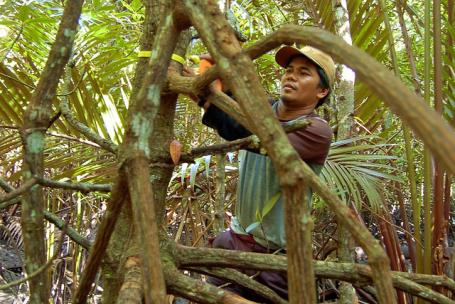Making the Right Choice on Indonesia’s Forest Moratorium

This piece originally appeared in the Jakarta Post. It was co-written with Dino Patti Djalal, Ambassador of the Republic of Indonesia and WRI Board member.
Ending months of uncertainty, President Susilo Bambang Yudhoyono of Indonesia made a courageous decision last week to extend the country’s forest moratorium. The new Presidential Instruction adds another two years of protection for over 43 million hectares of primary forests and peat land — an area the size of Japan.
This was a bold decision by a leader known for his commitment to sustainability. Extending the moratorium is a victory for the Indonesian people, business, and the planet.
The moratorium will directly benefit more than 80 million Indonesians who rely on forests for their livelihood. Many of these people are extremely poor and have struggled to gain recognition for their land rights. Extending the moratorium provides an opportunity to address these crucial issues.
Fears that the moratorium would hurt the economy are unfounded. Smallholder and industrial forestry, along with pulp and paper production, depend on forests, and contribute approximately US$21 billion to the economy--around 3.5 percent of Indonesia’s GDP. More than 4 million people are employed by this industry.
Furthermore, Indonesia is emerging as a world-class agricultural powerhouse. It’s already the world’s top producer of palm oil, used in countless consumer products, and is one of the largest rice producers. Limiting forest loss makes agriculture more sustainable by protecting key watersheds and limiting erosion.
Indonesia seeks to significantly increase production of 15 major commodity crops in coming years, including doubling palm oil production by 2020. If left unchecked, expanding palm oil production will increase pressure on the environment and local communities. Under the old model, valuable forest land would be cleared to make way for new plantations. With the moratorium in place, producers will be encouraged to intensify production on existing land.
Palm oil producers have the potential to increase yields from the 3.5 tons to potentially 8 tons per hectare though better management and new breeds of oil palm trees. WRI research shows ample opportunities to use already degraded land for sustainable palm oil development. For the province of Kalimantan alone, there is around 14 million hectares of degraded land that is available for such a purpose.
Furthermore, the moratorium will help Indonesian companies gain access to preferred global markets, which are increasingly committed to buying “deforestation-free” commodities. That’s why the association of Palm Oil Farmers Union (SPKS), an association of smallholders, publicly supported the moratorium.
Other business groups are working to advance sustainable palm oil efforts–and preventing deforestation is central to that effort. For instance, the Roundtable on Sustainable Palm Oil (RSPO) works with major companies to enter global markets by offering sustainability certification for palm oil growers and suppliers.
Fifteen percent of palm oil currently receives certification from the RSPO, and recent commitments from major companies like Godrej, Ruchi Soya, Wilmar, Kamani Oil Industries, and WF Limited demonstrate growing interest in this approach. A recent commitment from Asia Pulp and Paper to stop clearing natural forests similarly shows new thinking by industry.
President Yudhoyono’s leadership sends an important signal well beyond Indonesia’s borders that protecting forests is both an ecologically and economically smart strategy. Other countries are making a similar calculation: Brazil declared a moratorium on clearing forests for soy cultivation in 2006.
Since then, soy production has expanded, even as Brazil’s deforestation rate dropped by 80 percent. This was the lowest level in a quarter century. In Africa, countries like Gabon and Niger are taking innovative approaches to improve forest governance and restore lost trees.
Certainly the extension of the moratorium is not the end of the story. The new law needs to be implemented more effectively than its predecessor. The government should strengthen its efficacy though better technical guidance and outreach at the local level; improved monitoring and enforcement; and better cooperation among ministries. With the new moratorium in place, these reforms can continue.
It’s not every day that world leaders make the right decisions on tough choices. President Yudhoyono’s stance will enhance his reputation as a champion for sustainability — and moreover, will benefit people across Indonesia and beyond.
- LEARN MORE: For more information on how Indonesia can effectively use its newly extended forest moratorium, read our recent blog post, "Indonesia Extends its Forest Moratorium: What Comes Next?"